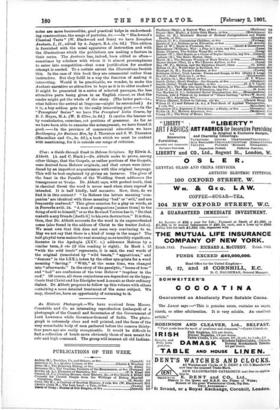Clue : a Guide through Greek to Hebrew Scripture. By
Edwin A. Abbott. (A. and C. Black.)—Dr. Abbott seeks to prove, among other things, that the Gospels, or rather portions of the Gospels, were derived from Hebrew originals, and that errors were intro- duced by an imperfect acquaintance with this original language. This will be best explained by giving an instance. The giver of the feast in the Parable of the Wedding Guest addresses the transgressor as `Drape. Dr. Abbott says, with perfect truth, that in classical Greek the word is never used when stern reproof is intended. It is half kindly, half sarcastic. How, then, do we find it in this context ? " In Hebrew the letters meaning ` com- panion ' are identical with those meaning `bad' or ` evil,' and are frequently confused." This gives occasion for a play on words, as in Proverbs xviii. 24. "A man of companions [makes them] to the doing of evil to himself," or as the Revised Version has it, "He that maketh many friends [doeth it] to his own destruction." It is thus, then, that Dr. Abbott accounts for the word in its unprecedented sense (also found in the address of Christ to the traitor Jul's). We must own that this does not seem very convincing to us. May we not say that there is a kind of irony in the usage ? The half-playful term makes the real meaning more terribly significant. Socrates in the Apologia (XXV. c.) addresses Meletus by a similar term, & Tay (if this reading is right). In Mark i. 13 "with the wild beasts" represents, it is said, the real words of the original (translated by "wild beasts," "apparitions," and "demons" in the LXX.), taken by the other synoptists for a word meaning "fasting." "With," at the same time, was changed into " afterwards." In the story of the paralytic, "borne of four" and " bed " are confusions of the true Hebrew " trapdoor in the roof." Of course, all these conjectures are dependent on the hypo- thesis that Christ and his Disciples used Aramaic as their ordinary dialect. Dr. Abbott proposes to follow up this volume with others containing a more detailed treatment of the same subject. We may, therefore, have an opportunity of returning to it.


































 Previous page
Previous page